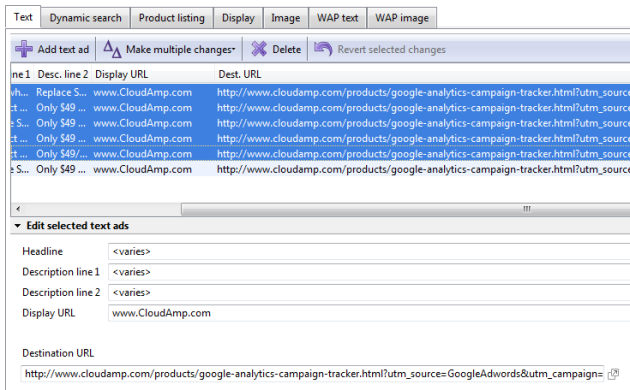
This post explores a simple way to see Google Adwords results inside of Salesforce, using Google Analytics Campaign tags. To set up custom campaigns, just add parameters (for example, utm_campaign and utm_source) to the end of your advertising URLs. Custom campaign values display in your Google Analytics reports, and you can capture them into leads in Salesforce using a tool like the Campaign Tracker for Google Adwords and Analytics.
You will be able to see which URLs visitors click to arrive at your web site and then become a lead, and which Adwords Keywords they searched for. As a bonus, if you get into the habit of tagging all incoming URLs to your web site, you will have better visibility not just into your advertising, but into any content or links you put out there — blogs, social media, sponsorships and more. Everything except Organic search engine traffic and some referral traffic can (and should) be tagged.
2. Update the Destination URLs in all your Adwords ads with the campaign URL parameters.
If you have a lot of ads, you can use the Adwords Editor client program to easily update / duplicate many ads at once. Adwords Editor makes it easy to copy / move items between Adgroups and Campaigns, and make bulk changes very quickly.
Note that whenever you make changes to your ad text or URL, they are sent back to Google for review. Rather than modify an existing ad, you may wish to create a new one so that the existing ad keeps running while your new ad is under review. Once the new ad is approved, you can delete the old ad if you want.
Redirects can also cause issues with Campaign tracking and Google Adwords attribution, so Google recommends updating the actual Destination URLs in your ads, instead of using a redirect.
For most Google Ads, you can set the tracking template at the Campaign level, using the Campaign URL options.
![]()
Example URL:
utm_campaign = Adwords Campaign Name
utm_source = GoogleAdwords
utm_medium = PPC or SEM (keep consistent with whatever categories you have defined)
utm_term = {keyword}
utm_content = optional parameter, commonly used for adgroup tracking
For tracking specific keywords, use Google’s keyword insertion format in the Destination URLs of your Google Adwords ads. utm_term is the Google Analytics campaign parameter for the keyword, so use utm_term={keyword} and Google will automatically insert the keyword that triggers your ad into the URL, so it will be tracked when a visitor clicks through to your site and submits a form.
Note: This same URL format and {keyword} insertion works in Microsoft AdCenter as well.
Google provides a URL builder tool which you can use if you would like, but you can also simply copy and modify the URL above. There is no need to create the campaigns in Google Analytics ahead of time — when a visitor arrives on your site from a Campaign tagged URL, the campaign data is automatically recorded.
Once you have tagged all your Google Adwords URLs, then you simply need a way of integrating the tracking data into Salesforce. I am partial to the Salesforce app we built here at CloudAmp, of course, Campaign Tracker for Google Adwords and Analytics. But there are plenty of other solutions to get Adwords data into Salesforce, including marketing automation software like Marketo or Hubspot.
If you are not using web-to-lead forms, but have an account signup process or eCommerce system, then you may want to have your developers capture the campaign tags from referral URLs directly into Salesforce via custom code. One thing you cannot use, sadly, is the popular Salesforce for Google Adwords, which is being end-of-lifed (shut down, in software-speak) on May 1, 2013.
However you decide to go, tagging all your incoming URLs with Google Analytics Campaign parameters will allow you to track Google Adwords results, as well as the success of other advertising and marketing efforts, directly inside of Salesforce.